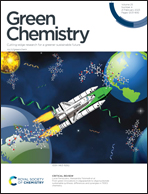High ionic conductivity and toughness hydrogel electrolyte for high-performance flexible solid-state zinc-ion hybrid supercapacitors enabled by cellulose-bentonite coordination interactions†
Abstract
From the perspective of resource renewability and environmental sustainability, hydrogel electrolytes based on naturally abundant cellulose are ideal materials for constructing flexible solid-state zinc-ion hybrid supercapacitors (ZHSCs) and novel electrochemical energy storage (EES) devices. However, the cellulose hydrogel electrolyte, which cannot possess high ionic conductivity and mechanical strength simultaneously, hinders the further application of this electrolyte in the field of ZHSCs. In this study, a high-performance cellulose hydrogel electrolyte was prepared by introducing bentonite (BT) nanoplatelets. The lamellar structure of BT nanoplatelets and coordination interaction between BT and cellulose were utilised to achieve a high ionic conductivity of 46.3 mS cm−1 at 25 °C and compressive strength of 2.93 MPa for the cellulose/BT-ZnSO4 hydrogel (CBH-Zn). The flexible solid-state ZHSC (CBH-ZHSC) possessed a maximum energy density of 97.4 W h kg−1 at a power density of 400 W kg−1 and capacity retention as high as 94% after 45 000 cycles at a current density of 10.0 A g−1. Furthermore, the integrated system consisting of the CBH-ZHSC and solar cells successfully achieved energy conversion, storage, and utilisation. This strategy provides new insights into the application of cellulose hydrogel electrolytes in the field of flexible EES devices.



 Please wait while we load your content...
Please wait while we load your content...